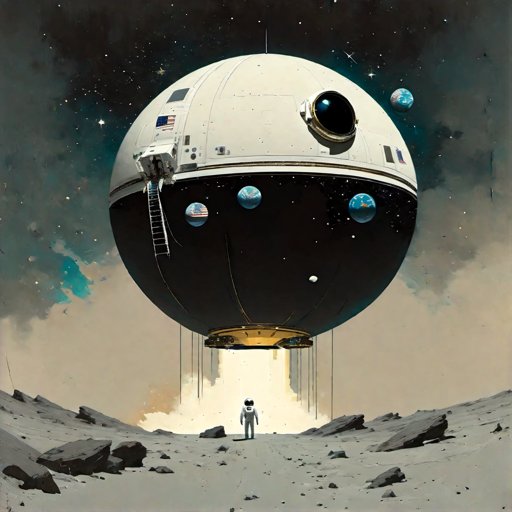To Boldly Go: The Allure and Peril of Pushing the Boundaries of Space Exploration
For millennia, humanity has gazed skyward, mesmerized by the twinkling tapestry of stars and the silent dance of celestial bodies.

We've woven stories and myths around constellations, projecting our hopes and fears onto the twinkling tapestry of the night sky. We saw heroes and monsters in the celestial dance, imagined chariots racing across the Milky Way, and whispered wishes upon falling stars, those fleeting sparks of cosmic dust burning briefly before fading into the eternal darkness.
For millennia, the moon, our closest celestial neighbor, was a silent observer, waxing and waning with the rhythm of the tides, fueling tales of moon goddesses and lunar transformations. We dreamt of reaching out, of touching its cratered surface, of planting our flag on that distant, luminous sphere.
And then, with the audacity of pioneers who dared to defy gravity, we did. We built colossal rockets that roared like fire-breathing dragons, spitting flames and smoke as they clawed their way skyward. We crafted tin cans that became our celestial chariots, hurtling through the void with the audacity of dreams and the ingenuity of inventors.
On July 20, 1969, the world held its breath as Neil Armstrong, a man made of flesh and bone, became the first human to walk on another celestial body. His footprint, etched into the lunar dust, was a testament to the insatiable human spirit, a giant leap for mankind that echoed across the cosmos.
But our celestial ambitions extend far beyond our single, dusty moon. We send robotic emissaries to Mars, rovers that crawl across its rust-red plains, searching for the whispers of ancient oceans and the faintest signs of life. We peer into the cosmos with telescopes so powerful they can see the birth of stars and the death of galaxies, unveiling secrets that have been hidden for billions of years.
This is no longer just a story woven in starlight. This is reality, a tangible, audacious quest to unravel the mysteries of the universe, to push the boundaries of human experience, and to answer the age-old question: are we alone?
We are no longer just looking up, mesmerized by celestial ballet. We are reaching out, hands outstretched, fingers grasping towards the infinite, driven by an insatiable curiosity and the audacious dream of leaving our footprints not just on the moon, but on the fabric of the universe itself.
Space exploration, once the whimsical province of comic books and childhood bedtime stories, has undergone a metamorphosis as breathtaking as any celestial event. It's no longer the domain of science fiction, relegated to the pages of pulpy magazines and the silver screen. No, it has blossomed into a vibrant reality, overflowing with awe-inspiring achievements and discoveries that would leave even the most imaginative sci-fi author speechless.
Imagine, for a moment, the first tentative steps on the moon – a grainy black and white image of a lone human figure etching his footprint into the lunar dust. Neil Armstrong's "one small step for man, one giant leap for mankind" wasn't just a soundbite, it was a seismic shift in human consciousness. It shattered the celestial ceiling, proving that the impossible was not only possible, but achievable with sheer grit, ingenuity, and a healthy dose of audacious dreaming.
Fast forward to the present day, and our cosmic endeavors have reached a level that would make Jules Verne blush. The James Webb Space Telescope, a marvel of human engineering, peers into the universe's very cradle, capturing images that rewrite textbooks and challenge our understanding of time, space, and the very fabric of reality. Galaxies billions of light-years old shimmer in its sights, their swirling arms and nascent stars whispering tales of creation older than time itself. Exoplanets, once theoretical blips in astronomical data, are revealed in stunning detail, their swirling clouds and rocky landscapes raising the tantalizing possibility of life beyond our own pale blue dot.
But the impact of space exploration isn't confined to the realm of mind-boggling images and scientific breakthroughs. It has a ripple effect that touches every aspect of our lives. Every time you swipe your phone or marvel at the clarity of a medical scan, you're reaping the benefits of technologies born from the crucible of space exploration. GPS, weather forecasting, even the life-saving materials used in modern surgery – all have their roots in the quest to reach for the stars.
Space exploration has also become a potent catalyst for international collaboration, reminding us that beneath the banners and borders, we are all stargazers, united by a shared sense of wonder and curiosity. In the face of the vastness of the cosmos, our petty squabbles seem to shrink, replaced by a shared desire to understand the universe and our place within it.
So, yes, space exploration has come a long way from the realm of fantastical notions. It has become a testament to human ambition, a catalyst for innovation, and a beacon of hope in a world that often feels increasingly small. It reminds us that we are not just earthbound creatures, but cosmic explorers, capable of reaching for the stars and rewriting the very story of our existence. And who knows, maybe one day, those footprints on the moon will be just a footnote in a much grander tale – the epic saga of humanity's journey across the cosmos.
But like any journey, the road to the stars is paved with both benefits and detriments. Before we blast off into an unknown future, let's take a moment to weigh the potential rewards and risks of this celestial endeavor:
???? Benefits:
- Unveiling the Universe's Secrets: Every new mission, every daring rover landing, every robotic probe venturing into the unknown, peels back another layer of the cosmic onion. We're learning about the formation of stars, the possibility of life on other planets, the very fabric of the universe itself. This knowledge isn't just fodder for scientific papers; it has the potential to revolutionize our understanding of physics, energy, and even our own origins.
- Technological Leapfrogs: The challenges of space exploration breed innovation. Building a rocket that can withstand the inferno of launch requires pushing the limits of material science. Creating a self-sustaining habitat on Mars demands breakthroughs in renewable energy and closed-loop systems. These advancements don't stay locked away in laboratories; they trickle down to our everyday lives, improving medical equipment, communication technologies, and even the clothes we wear.
- Inspiring the Next Generation: The audacious spirit of space exploration fires young imaginations, igniting a passion for science, technology, engineering, and math (STEM) subjects. Seeing astronauts floating in zero gravity or robots exploring alien worlds plants the seeds of curiosity and ambition. These inspired minds become the engineers, scientists, and dreamers who will shape our future, not just on Earth, but among the stars.
⚠️ Detriments:
- Astronomical Costs: Every rocket launch, every satellite deployed, comes with a hefty price tag. While the long-term benefits of scientific discovery are undeniable, the immediate costs can be staggering, diverting resources away from pressing issues like poverty, hunger, and climate change. We need a responsible balance between celestial aspirations and earthly realities.
- Environmental Impact: The carbon footprint of launching rockets and manufacturing spacecraft is significant. Space debris poses a growing threat to satellites and future missions. We must explore sustainably, minimizing our environmental impact and developing cleaner technologies for space travel.
- The Great Unknown: The universe is vast, and with that vastness comes an inherent risk. We might encounter unforeseen dangers, from cosmic radiation to hostile environments or even unknown lifeforms. venturing into the unknown demands a healthy dose of caution and a commitment to prioritizing the safety of our explorers.
???? The Way Forward:
Space exploration is a double-edged sword, with the potential to elevate humanity or leave us floundering in the cosmic dust. So, how do we navigate this celestial tightrope? By embracing a balanced approach that prioritizes both the "wow" factor of discovery and the "how" of responsible exploration:
- Focus on Sustainable Technologies: Invest in cleaner fuels, reusable rockets, and efficient spacecraft. Let's leave a legacy of exploration, not pollution.
- Embrace International Collaboration: Sharing resources, expertise, and knowledge across borders multiplies our chances of success while fostering global cooperation and understanding.
- Prioritize Ethics and Transparency: Openly discuss the risks and rewards of space exploration, ensuring public understanding and involvement in decision-making.
- Never Forget Our Home Planet: The Earth is our cradle, our oasis in the vastness of space. Let's use the insights gained from exploring the cosmos to solve the challenges we face here, ensuring a sustainable future for all.
The universe is a vast and wondrous playground, beckoning us with the promise of untold discoveries. But before we dive headfirst
What's Your Reaction?


















